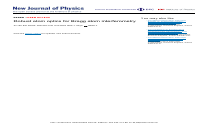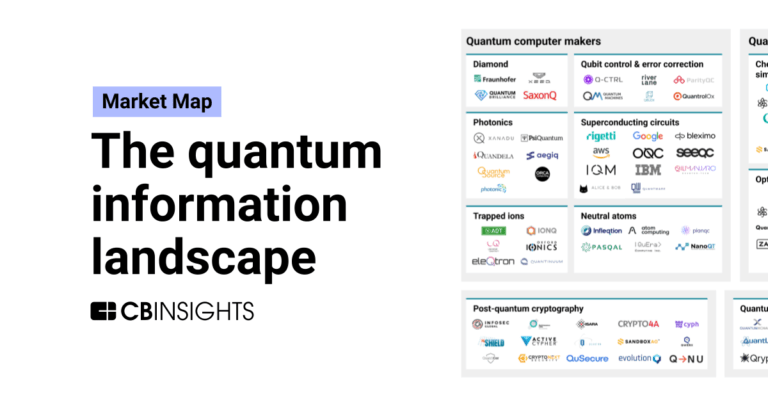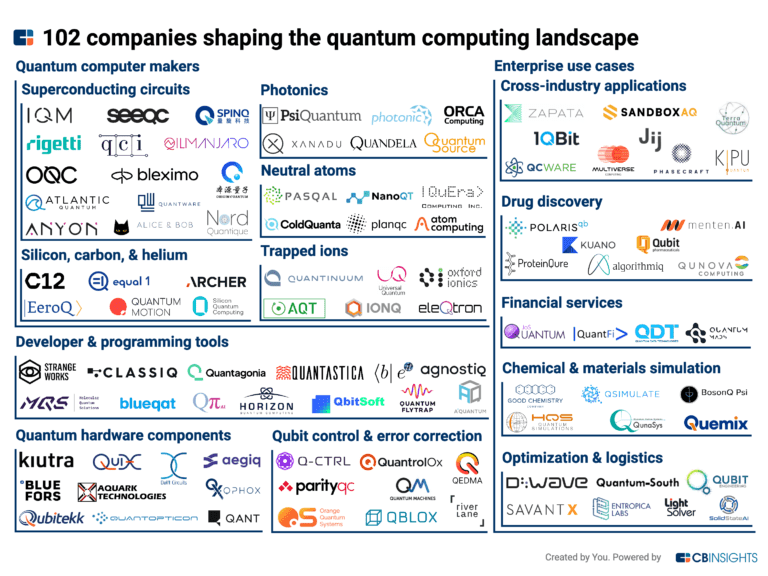
Q-Ctrl
Founded Year
2017Stage
Series B - IV | AliveTotal Raised
$132.22MLast Raised
$59M | 6 mos agoMosaic Score The Mosaic Score is an algorithm that measures the overall financial health and market potential of private companies.
+28 points in the past 30 days
About Q-Ctrl
Q-Ctrl specializes in quantum control software designed for the performance and utility of quantum technology across sectors. The company offers quantum computing, error suppression, and algorithm optimization solutions and provides educational tools and sensing solutions. It serves the biotechnology, cybersecurity, defense, finance, logistics, and aerospace sectors. The company was founded in 2017 and is based in Chippendale, Australia.
Loading...
Q-Ctrl's Product Videos


ESPs containing Q-Ctrl
The ESP matrix leverages data and analyst insight to identify and rank leading companies in a given technology landscape.
The quantum sensors market encompasses a broad range of devices that gain information by tapping into the delicate interactions of quantum phenomena with their surrounding environment. These devices are being built for a wide array of applications — including underground mapping and medical imaging — and can be smaller, cheaper, and thousands of times more precise than conventional approaches.
Q-Ctrl named as Leader among 15 other companies, including Infleqtion, SandboxAQ, and Quantum Light Metrology.
Q-Ctrl's Products & Differentiators
Q-CTRL Embedded
Q-CTRL Embedded integrates effective error suppression technology directly into your platform technology stack, offering customers frictionless performance-management, maximizing customer retention, and delivering the value users demand.
Loading...
Research containing Q-Ctrl
Get data-driven expert analysis from the CB Insights Intelligence Unit.
CB Insights Intelligence Analysts have mentioned Q-Ctrl in 2 CB Insights research briefs, most recently on May 7, 2024.
Expert Collections containing Q-Ctrl
Expert Collections are analyst-curated lists that highlight the companies you need to know in the most important technology spaces.
Q-Ctrl is included in 2 Expert Collections, including Quantum Tech.
Quantum Tech
611 items
This Expert Collection contains private and recently exited companies working on quantum computing, quantum communication, post-quantum cryptography, quantum sensors, and other quantum tech.
Semiconductors, Chips, and Advanced Electronics
7,329 items
Companies in the semiconductors & HPC space, including integrated device manufacturers (IDMs), fabless firms, semiconductor production equipment manufacturers, electronic design automation (EDA), advanced semiconductor material companies, and more
Q-Ctrl Patents
Q-Ctrl has filed 2 patents.
The 3 most popular patent topics include:
- mathematical optimization
- optimization algorithms and methods
- quantum computing

Application Date | Grant Date | Title | Related Topics | Status |
|---|---|---|---|---|
6/24/2019 | 12/28/2021 | Quantum information science, Quantum mechanics, Quantum computing, Quantum measurement, Quantum cryptography | Grant |
Application Date | 6/24/2019 |
|---|---|
Grant Date | 12/28/2021 |
Title | |
Related Topics | Quantum information science, Quantum mechanics, Quantum computing, Quantum measurement, Quantum cryptography |
Status | Grant |
Latest Q-Ctrl News
Mar 21, 2025
Q-CTRL, NVIDIA, and OQC Collaborate to Accelerate Quantum Error Suppression Q-CTRL, NVIDIA, and OQC Collaborate to Accelerate Quantum Error Suppression Q-CTRL , in partnership with NVIDIA and Oxford Quantum Circuits (OQC) , has demonstrated a 500,000x reduction in classical compute costs for quantum error suppression tasks by leveraging NVIDIA GPUs and accelerated libraries . The work focuses on optimizing the layout ranking process, a computationally intensive step in mapping abstract quantum circuits to physical qubits. This process involves evaluating potential mappings while accounting for qubit connectivity constraints and hardware performance variations, which becomes exponentially complex as qubit counts scale. The team developed GPU-accelerated implementations of the layout ranking process using NVIDIA’s RAPIDS and cuDF libraries. These implementations employ two levels of parallelism: (1) layout-level parallelism, where multiple circuit layouts are simultaneously evaluated across GPU threads, and (2) qubit-level parallelism, where computations within each layout are further distributed across thousands of GPU operations. Benchmarking results showed a 10x speedup for real quantum circuits (e.g., Bernstein-Vazirani circuits) and up to 300,000x speedup for large-scale, randomized layouts compared to CPU-based methods. At 200 qubits, the cost-per-layout dropped from $1 to $0.01 when using GPUs instead of CPUs, demonstrating significant computational efficiency. The layout ranking process is essential for minimizing errors and maximizing circuit fidelity. For example, selecting optimal layouts can improve circuit fidelity by over 10x compared to suboptimal choices. However, as qubit counts increase, the number of possible layouts grows exponentially, creating a computational bottleneck. The GPU-accelerated solutions address this by enabling parallel evaluation of layouts and qubit-level operations, reducing both computational time and cost. The layout ranking process plays a critical role in reducing errors and improving execution fidelity. Optimal layout selection can improve circuit fidelity by over 10x compared to suboptimal choices, but the search space scales exponentially with the number of qubits. The GPU-accelerated approach addresses this bottleneck by massively parallelizing the ranking procedure, reducing both computational time and cost. In benchmarking experiments, evaluating 1 million layouts at 200 qubits took 1.2 minutes with a GPU, compared to 11.7 minutes on a CPU. Two benchmarking experiments were conducted: Full-Pipeline Benchmark: Using real quantum circuits, the GPU-accelerated approach delivered a 10x speedup over the Qiskit VF2PostLayout pass, reducing ranking time from 11.7 minutes (CPU) to 1.2 minutes (GPU) for 1 million layouts at 200 qubits. Modular Benchmark: Scaling to 1,000 qubits and 500,000 layouts per circuit, the GPU-accelerated ranking was 100,000 to 300,000 times faster than the CPU-based approach. Cost analysis showed GPU-based ranking at $0.01 per layout compared to CPU-based ranking at $1 per layout. The collaboration also explored the integration of AI-driven techniques for layout ranking, building on Q-CTRL’s prior work in AI-augmented quantum error suppression. For example, Q-CTRL’s “ Learning to Rank ” method uses machine learning to optimize layout selection, further improving circuit fidelity. Future advancements could include AI-powered layout ranking and faster layout generation, which would reduce compilation times and improve algorithm performance. These innovations are critical for scaling quantum computing to thousands of qubits, enabling efficient hardware-aware compilation and reducing errors in practical quantum applications. For more details, visit Q-CTRL’s announcement here . March 21, 2025
Q-Ctrl Frequently Asked Questions (FAQ)
When was Q-Ctrl founded?
Q-Ctrl was founded in 2017.
Where is Q-Ctrl's headquarters?
Q-Ctrl's headquarters is located at 93 Shepherd Street, Chippendale.
What is Q-Ctrl's latest funding round?
Q-Ctrl's latest funding round is Series B - IV.
How much did Q-Ctrl raise?
Q-Ctrl raised a total of $132.22M.
Who are the investors of Q-Ctrl?
Investors of Q-Ctrl include Main Sequence, John Eales, Salesforce Ventures, Alumni Ventures, DCVC and 24 more.
Who are Q-Ctrl's competitors?
Competitors of Q-Ctrl include Quantum Machines and 5 more.
What products does Q-Ctrl offer?
Q-Ctrl's products include Q-CTRL Embedded and 4 more.
Who are Q-Ctrl's customers?
Customers of Q-Ctrl include IBM, Rigetti Computing, EY, NQCC and Northwestern University.
Loading...
Compare Q-Ctrl to Competitors

Riverlane focuses on quantum computing through the development of an error correction stack in the quantum computing industry. The company provides tools and technologies for controlling unstable qubits and correcting data errors, essential for achieving fault-tolerant quantum computing. Riverlane collaborates with technology and academic partners to address the challenges in quantum computing and enable its vast potential. It was founded in 2016 and is based in Cambridge, United Kingdom.

Quantum Machines focuses on quantum control and electronics solutions for quantum computing technologies. The company offers products including the Quantum Orchestration Platform (QOP), which provides quantum sequences and pulse-level programming, and cryogenic control systems that support quantum research and device operation. Quantum Machines serves quantum computing researchers and system developers. It was founded in 2018 and is based in Tel Aviv, Israel.
Qedma is a company that develops software for the quantum computing industry. The company provides options for quantum error suppression and mitigation, along with characterization software for multi-qubit systems, which aim to support quantum computations. Qedma's products are intended to work with existing quantum hardware across various platforms, targeting quantum hardware developers. It was founded in 2020 and is based in Tel Aviv, Israel.

Qblox specializes in the development of quantum technology within the quantum computing industry. The company offers scalable and low-latency qubit control equipment designed to enhance the performance and scalability of quantum computers. Qblox primarily serves the research sector, providing tools that support scientists in advancing quantum computing. It was founded in 2018 and is based in Delft, Netherlands.

ParityQC operates as a quantum architecture company that specializes in the development of blueprints and operating systems for scalable quantum computers. Its offerings include the creation of architectural designs that enhance the performance of quantum computers and the development of an operating system tailored for quantum computing applications. The company primarily collaborates with quantum hardware developers to advance the field of quantum computing. It was founded in 2020 and is based in Innsbruck, Austria.

Orange Quantum Systems specializes in the development of test equipment for the quantum computing industry. Its products facilitate the testing and performance evaluation of quantum chips for design and fabrication teams. The company primarily serves the quantum computing research community with tools that enable throughput and reliable testing in a cryogenic environment. It was founded in 2020 and is based in Delft, Netherlands.
Loading...


